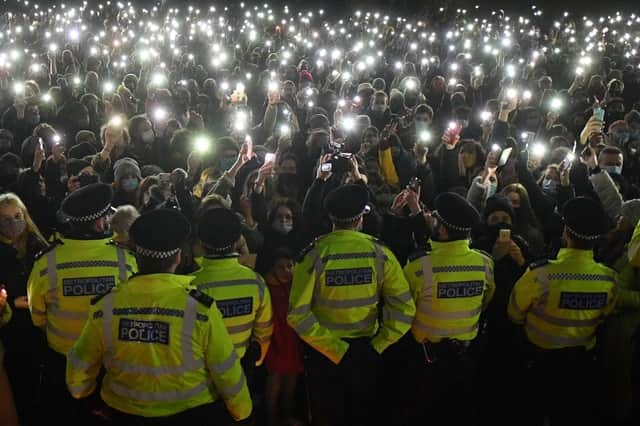Labour is opposing legislation plans to impose controls on protests - but will it be enough to kill the bill?


Labour has announced it will vote against the Government’s key crime legislation, which includes plans to impose controls on protests in England and Wales.
The Police, Crime, Sentencing and Courts Bill will give Home Secretary Priti Patel and police officers the powers to impose conditions on protests, including the “use of noise”.
Advertisement
Hide AdAdvertisement
Hide AdShadow justice secretary David Lammy said the legislation contains “poorly thought out” proposals and has instead urged ministers to drop the Bill and work cross-party in order to tackle violence against women.
‘A national demand for action to tackle violence against women’
The shadow justice secretary’s calls for the Government to work together to address issues regarding violence against women comes in the wake of the death of Sarah Everard, who went missing on 3 March while walking home from a friend’s house in south London.
Mr Lammy said Ms Everard’s death has “instigated a national demand for action to tackle violence against women”.
Addressing the legislation’s plans to impose controls on protests, Mr Lammy added: “This is no time to be rushing through poorly thought-out measures to impose disproportionate controls on free expression and the right to protest.
Advertisement
Hide AdAdvertisement
Hide Ad“Now is the time to unite the country and put in place long overdue protections for women against unacceptable violence, including action against domestic homicides, rape and street harassment. And we must tackle the misogynistic attitudes that underpin the abuse women face.
“Instead, the Conservatives have brought forward a Bill that is seeking to divide the country. It is a mess, which could lead to harsher penalties for damaging a statue than for attacking a woman.”
Mr Lammy said that on this basis, Labour will be voting against the Police, Crime, Sentencing and Courts Bill, which is due to come before the Commons this week.
“We are calling on the Government to drop its poorly thought out proposals and instead work with Labour to legislate to tackle violence against women which is forcing so many across the country to live in fear,” Mr Lammy said.
Advertisement
Hide AdAdvertisement
Hide Ad“As well as to deliver the important areas that are long promised, like tougher sentences for attacks on frontline workers and increased sentences for terrorists,” he added.
What happens next?
MPs will debate the second reading of the Police, Crime, Sentencing and Courts Bill today (Mon 15 March), with Labour planning to block the bill at its first parliamentary hurdle, instead of abstaining as had originally been anticipated.
Mr Lammy is urging other ministers to ditch the proposals, but Amanda Milling, co-chairwoman of the Conservative Party, said it was “shocking” that Labour is “trying to block tough new laws to keep people safe, including many vital measures to protect women from violent criminals”.
The legislation also plans to expand child abuse laws, look at allowing judges to give Whole Life Orders for the premeditated murder of a child, life sentences for killer drivers and powers to stop the automatic release halfway through a sentence for serious violent and sexual offenders.
Advertisement
Hide AdAdvertisement
Hide AdMs Milling said: “By voting against this Bill Labour are voting against tougher sentences for child murderers and sex offenders, killer drivers and measures that protect the vulnerable.
“This Conservative Government is working to keep people safe by reforming our justice system to keep our communities safe so that everyone can live their lives free from the fear of crime.”